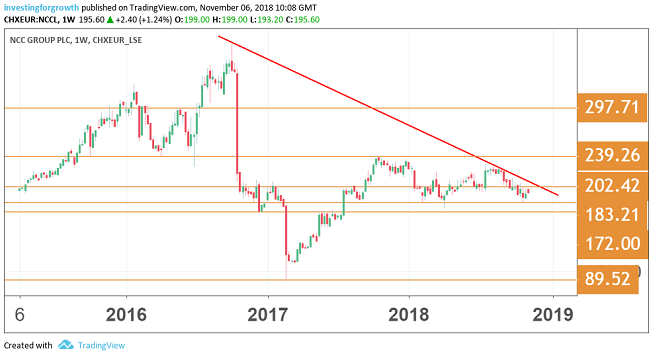Stockwatch: An ugly duckling growing swan feathers
6th November 2018 10:16
by Edmond Jackson from interactive investor
After an Icarus-like stock plunge, companies analyst Edmond Jackson expects positive newsflow and backs a smart new chief executive to lead a turnaround.

Does a de-rating of cyber security stocks represent a buying opportunity, in a sector potentially more resilient than most cyclicals?
This is said now to be a $75 billion (£57.6 billion) global industry, with organisations'data breaches regularly making news headlines, while "ransomware" outbreaks and phishing scams are on the increase. The "internet of things" connecting devices of all kinds, continues to expand data and needs protecting.
Tough rules have appeared requiring that businesses protect data about whoever they deal with, backed in EU countries by fines of up to £17.5 million equivalent for shortfalls. Cyber-attacks are any organisation's Achilles heel, thus it is fair to assume this kind of spending should be relatively resilient to a recession – say if the credit cycle is indeed rolling over.
Not surprisingly then, relevant stocks got chased up. But with froth wiped off "growth" and the tech-sector corrected down, there have been some sharp falls.
FTSE 250-listed Sophos Group plunged nearly 40% from a 570p peak to 407p. At 490p currently, it still trades on a forward price/earnings (PE) ratio of over 33 times, offers a sub-1% dividend and gearing over 200%.
FTSE Small-Cap NCC Group is more a turnaround situation, its 70%-plus plunge in stock price happening in late 2016/early 2017 – from 368p to 107p, currently 195p. The trigger was three unrelated contract cancellations in quick succession, and a deferral, said in December 2016 to de-rate operating profit growth to 5% in respect of the year to end-May 2017.

Source: TradingView Past performance is not a guide to future performance
But things ended up a lot worse in terms of headline results: a £53.4 million operating loss at the 2017 prelims that July, amid £71 million of charges including £62 million intangible asset write-downs. Annual organic revenue growth was just 3% on continuing operations or 17% including acquisitions.
Most directors were replaced, however, the new chairman insisted:
"the business retains strengths and significant organic growth, also a strong balance sheet... at the forefront of a constantly evolving and complex market."
Long-term chequered history
Such an Icarus-like stock plunge was more likely a manifestation of an acquisitive plc losing control, and NCC has form. It originated as the non-profit National Computing Centre formed by the Labour government in 1966 to promote computer usage. A commercial side provided software escrow (where source code is deposited with a third party in between a software supplier and its licensee) also consultancy/system services, but which petered out after the Y2K mania.
NCC initially floated on AIM in 2004 and became busily acquisitive: it's frustrating how its announcements referencing the 2016 debacle don't really explain the loss of contracts – even respecting due regard to commercial confidentiality – making it tricky to understand what really happened, any loss of competitive advantages etc.
Instead, paragraphs with consultancy-speak on re-positioning and the like, which leave best assumptions at too many takeovers and taking eyes off the ball – especially in a fast-moving technology business. A relatively small company expanding internationally would have added to risks, however sensible strategically.
Inevitably, NCC shares will trade at a discount to peers until it establishes a more consistent record. Yet, given the initiatives by a new board – in context of inherent demand to tackle cybercrime – there's fair chance news will evolve positively overall, benefiting its stock.
Manifesto for recovery and growth
At the July 2017 prelims, the new executive chairman (who became a non-executive director once a chief executive replacement was appointed) proclaimed:
"When we have successfully managed our way through this transitional period, improved our organisation and how we go to market, we see significant upside opportunities and material value creation."
In its financial year to May 2018, the group managed a pre-tax profit recovery to £11.9 million on continuing operations' revenue up 8.3% to £233 million. Within this it's a tale of two parts with "Assurance" – in cyber security and risk mitigation services – dominating revenue albeit "Escrow" providing the bulk of profits.
Assurance turned a £53.5 million operating loss into a £4.5 million profit, on revenue up 13.8% to £194 million; although adjusting for currency and third party re-sales, revenue growth was 23% and adjusted operating profit rose 63.5% to £17 million. The UK disappointed, prompting a new approach to market, although the US and Netherlands achieved high-teens percentage revenue growth.
"Escrow" edged up revenue a modest 4.3% to £38.8 million, albeit boosted by a prior year revenue recognition issue, thus organic growth was closer to 2.7%. Yet its operating profit contribution rose 13.5% to £21.8 million or by 6.9% to £21.6 million on an adjusted basis.
So, with the chairman asserting "much remains yet to be done" in terms of improvements, this looks quite a promising base to work with – despite its apparent complexities, from studying the operating reviews. Implicitly, they have identified further turnaround initiatives.
| NCC Group - financial summary | |||||||
|---|---|---|---|---|---|---|---|
| year ended 31 May | Estimates | ||||||
| 2013 | 2014 | 2015 | 2016 | 2017 | 2018 | 2019 | |
| Turnover (£ million) | 99.2 | 111 | 134 | 209 | 215 | 233 | |
| IFRS3 pre-tax profit (£m) | 18.8 | 23.2 | 21.4 | 9.4 | -44.8 | 11.9 | |
| Normalised pre-tax profit (£m) | 21.2 | 23.8 | 22.0 | 28.2 | 24.1 | 29.5 | 36.7 |
| Operating margin (%) | 22.1 | 22.1 | 17.1 | 14.2 | 4.0 | 5.6 | |
| IFRS3 earnings/share (p) | 6.9 | 8.6 | 7.8 | 2.5 | -20.4 | 2.5 | |
| Normalised earnings/share (p) | 8.0 | 8.8 | 7.9 | 9.8 | 6.2 | 8.3 | 9.2 |
| Earnings per share growth (%) | 28.7 | 10.4 | -10.8 | 24.1 | -36.3 | 33.9 | 10.8 |
| Price/earnings multiple (x) | 23.5 | 21.2 | |||||
| Historic annual average P/E (x) | 22.5 | 28.0 | 32.0 | 49.3 | 47.0 | ||
| Cash flow/share (p) | 9.3 | 11.3 | 9.4 | 5.4 | 10.1 | ||
| Capex/share (p) | 2.4 | 5.2 | 6.2 | 5.3 | 6.5 | ||
| Dividend per share (p) | 12.0 | 3.3 | 3.7 | 4.2 | 4.7 | 4.7 | 5.2 |
| Dividend yield (%) | 2.4 | 2.7 | |||||
| Covered by earnings (x) | 2.9 | 2.7 | 2.2 | 2.4 | 0.6 | 1.8 | 1.8 |
| Net tangible assets per share (p) | -17.0 | -14.6 | -32.0 | -12.5 | -20.1 | -11.5 |
Source: Company REFS Past performance is not a guide to future performance
Capable new chief executive, and a non-exec buying stock
Two months ago, the AGM message was a suitably vague: "a solid start to the year" with the chief executive (effective from December 2017) Adam Palser referring to a transformation programme "in its early stages but has made a promising start." Such a non-specific story with its interims not due until 24 January 2019, and no past form of updating before the closed period, falls short of a real trigger to buy.
Yet in a positive industry context, NCC's new chief executive does look a good bet. Over 2015-17 he was appointed to public services provider NSL by its private equity owner, led a successful transformation and sale, and was previously with QinetiQ plc in a business development role having been responsible for its cyber, information warfare and professional services businesses.
He boasts proven experience both at turnaround for equity owners and in cyber security, moreover, he's a bright spark with a science First and PhD from Balliol Oxford. Last January he was granted 178,601 share options at 100p which seems generous to be so in-the-money – why not stagger them more generously, well out-of-the-money? - if subject to performance criteria.
The only director buying has been a bit of a formality - a non-executive director effective from 25 April who followed good boardroom practice to acquire 9,500 shares at 202.2p in early October.
Speculative but merits attention, even tucking away
A rigorous investing approach is to wait-and-see for any director buying nearer the closed period before interims, although an alert new boss ought to pre-empt upsets. The more likely prospect appears delivering a 2019 outcome broadly in line with expectations then, hopefully, advancing profitability.
Speculation is involved and it would reassure to see the chief executive own decent equity than risk-free, in-the-money options. But, despite NCC's history, I am inclined to think its blend of "cyber security as a growth industry", fresh management and international reach, bode well - at least to make this a stock to follow. At 195p: long-term speculative buy.
Edmond Jackson is a freelance contributor and not a direct employee of interactive investor.
These articles are provided for information purposes only. Occasionally, an opinion about whether to buy or sell a specific investment may be provided by third parties. The content is not intended to be a personal recommendation to buy or sell any financial instrument or product, or to adopt any investment strategy as it is not provided based on an assessment of your investing knowledge and experience, your financial situation or your investment objectives. The value of your investments, and the income derived from them, may go down as well as up. You may not get back all the money that you invest. The investments referred to in this article may not be suitable for all investors, and if in doubt, an investor should seek advice from a qualified investment adviser.
Full performance can be found on the company or index summary page on the interactive investor website. Simply click on the company's or index name highlighted in the article.
Disclosure
We use a combination of fundamental and technical analysis in forming our view as to the valuation and prospects of an investment. Where relevant we have set out those particular matters we think are important in the above article, but further detail can be found here.
Please note that our article on this investment should not be considered to be a regular publication.
Details of all recommendations issued by ii during the previous 12-month period can be found here.
ii adheres to a strict code of conduct. Contributors may hold shares or have other interests in companies included in these portfolios, which could create a conflict of interests. Contributors intending to write about any financial instruments in which they have an interest are required to disclose such interest to ii and in the article itself. ii will at all times consider whether such interest impairs the objectivity of the recommendation.
In addition, individuals involved in the production of investment articles are subject to a personal account dealing restriction, which prevents them from placing a transaction in the specified instrument(s) for a period before and for five working days after such publication. This is to avoid personal interests conflicting with the interests of the recipients of those investment articles.